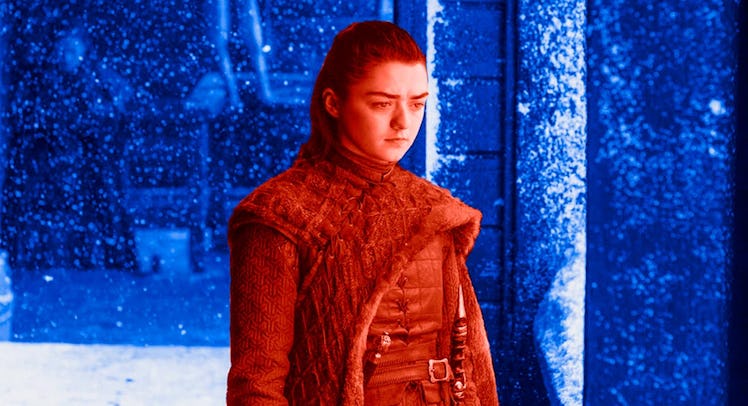Arya Stark Corrected a Huge ‘Endgame’ Mistake
It's been a strange weekend. But, we have a clear winner.

Over the weekend, the venn diagram of fans who enjoy fantasy and superhero blockbusters alike had a big showing with both the conclusion of Marvel’s Phase Three with Avengers: Endgame and a mid-season climactic battle in the final season of Game Of Thrones, The Long Night. That episode ended with one of the biggest surprise endings in the whole series, although perhaps it shouldn’t have been so unexpected. Arya, the youngest Stark daughter and trained assassin, murdered the Night King with her Valyrian steel dagger, shattering him and his entire army of wights and other White Walkers.
Just when all seems lost, and the Night King is standing over Bran, reaching for his sword to kill him and ‘wipe out’ the history of Westeros, Arya lunges from the darkness, screaming in a guttural, womanly, and high-pitched tone. The Night King turns around, grabs her by the neck, and Arya, mirroring a training session between her and Brienne in the last season, drops her dagger into her right hand, and stabs the Night King in the belly. He shatters into ice, and so does his army. Everyone is saved, thanks to Arya.
There are many reasons why this moment is so powerful. For one, killing the Night King was something Jon Snow, the King In The North and secret Targaryen, has failed to do for several seasons. That his kid sister could do it in a jiff is a testament to her strength, power, and character evolution. It seemed the living were all but doomed to die at the hands of the dead. And comparing Arya’s journey with a character in another universe — Black Widow, who died on Vormir in a self-sacrifice to retrieve the Soul Stone to reverse Thanos’s snap — it’s all the more impressive.
Black Widow, born Natasha Romanova, much like Arya, was trained as an assassin from childhood to become a hero. In Natasha’s case, she becomes an Avenger. Throughout the dozens of films — from her introduction as the ‘sexy secretary’ of Tony Stark in Iron Man 2, Black Widow has been relegated to sidekick or love-interest status. Age of Ultron largely focuses on her relationship with Bruce Banner, rather than her own past or future with the team. And in Endgame, she spends five years of the movie keeping together what remains of the Avengers to police the world while the other Avengers move on, without much of a thanks or a nod to her sacrifice. She doesn’t even get a funeral, even after the battle ends. When Black Widow dies, it makes sense: she says the only family she’s ever had were the Avengers. She died for them.
But it’s also deeply frustrating. After a decade of being a b-character, Natasha remains a b-character in death. It’s a blip on the radar, overshadowed by Tony’s sacrifice and Cap’s fulfilling conclusion on his character.
Much like Black Widow, Arya’s character has always been defined by her strength and interest in battle, at the cost of other pursuits in life, like romance or friendship. But that doesn’t mean she sacrifices herself. Game of Thrones has been rightly criticized for its overuse of female nudity and the reliance on female suffering, rape, and torture in the service of greater plot points. Even the most powerful leaders, like Cersei, have suffered such fates. The same criticism can not be lobbed at the series’ treatment of Arya, who has, over the past several seasons, proven herself to be one of the most adept assassins in the universe who has no time to be objectified or to self-sacrifice herself for other men. Since she was young, she has focused on being self-reliant and stronger, faster, and better in battle than the rest. Her killing the Night King, of course, makes perfect sense, in hindsight. She has been training in service of the only God she knows — Death — for the entire show. The audience watched her toil in Braavos for several seasons in the house of the Faceless Men for a reason. She was always going to be the one to kill the Night King.
And that her murder one of the “Big Bads” of the series happens just hours after she reconnects with Gendry and has sex with him deepens her journey as an empowered assassin slash woman, rather than cheapens it. Arya, a Lady of Winterfell, was never going to be a princess or proper. She has almost always taken what she wanted, regardless of social mores. Her seeing Gendry again, the one person who she had a soft-spot for in hear near-unstoppable journey to becoming a fighter, and coupling with him before being the one person to end the fighting is unheard of in the genre. She took what she wanted and, shockingly, didn’t die for it. She didn’t sacrifice herself so a man, like Jon Snow, could save the day. She just saved the day herself.
It was a powerful moment to watch. Arya has always known who she is, and who she was going to become. But to watch her really do it is satisfying. And compared to another superhero, female, trained assassin in another universe, it is all the more impressive a signifier of how far we’ve come in feminism and pop culture — and a sign of how far we still have to go.